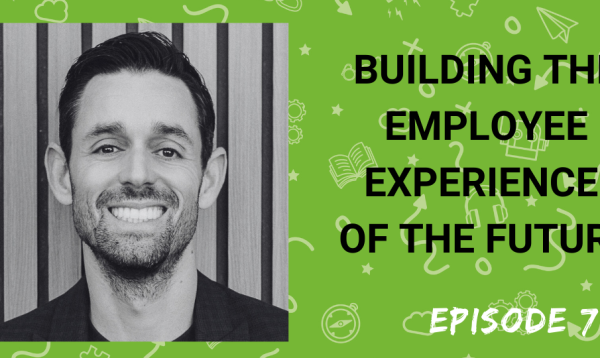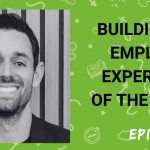In this interview Matt Alder speaks to Stephane Kasriel CEO of Upwork.
A recent report published by McKinsey indicates that the digital talent marketplaces driving the so called “gig economy” could play a significant role in increasing global GDP by $2.7 Trillion by 2025.
Upwork is currently the biggest talent marketplace place in the world and I was delighted to get the chance to speak to Stephane Kasriel their CEO for this week’s podcast.
The topics we discuss include:
• The merger of Elance and oDesk that created Upwork
• How a talent marketplace actually works
• The huge diversity of skills represented on the platform
• Remote working and dynamic corporate talent pooling
• Solving the global digital skills crisis
• What the future of work will look like
Stephane also talks about Upwork’s experience of having an employee base that is 70% freelance and distributed across the world
Links from this episode:
The Future of Work, published by Faster Future Publishing
McKinsey Report: Connecting Talent With Opportunity In The Digital Age
Subcribe to this podcast in iTunes
Transcript:
Matt Alder [00:00:00]:
Support for this podcast comes from Format. Format provide award winning careers websites to employers such as View, Atkins and Muller. Working with Format can help you attract and engage higher numbers of better quality applicants. They get these results by their complete focus on the candidate experience. Fantastic technology that enables long term passive candidate engagement and seamless integration with your ats. For more information and to get in touch for a free review of your career site, Please go to www. Format.com podcast Format is spelt with a number 4, then M A T the web address again. Www. Format.com podcast.
Matt Alder [00:01:05]:
Hi everyone and welcome to episode 22 of the Recruiting Future podcast. I’m absolutely fascinated by the way that work is changing and earlier in the year I contributed a chapter on the changing world of work to a recently published book on the future of business. In the chapter I talk about the growth of talent marketplaces and I’m delighted that this week’s guest is Stephanie Kasriel, who is CEO of Upwork, which is basically the biggest talent marketplace on the planet. Enjoy the interview. Hi everyone and welcome to another Recruiting Future podcast interview. My guest this week is Stephanie Kasriel who is the CEO of upwork. Hi Stephanie, how are you doing?
Stephanie Kasriel [00:01:49]:
Hi Matt. Really well, thank you.
Matt Alder [00:01:51]:
Cool. So could you, for those people who may not be familiar with Upwork because it’s obviously an established business but a fairly new, could you just talk us through what Upwork is and what you’ve been doing with that?
Stephanie Kasriel [00:02:08]:
Sure, yeah. So first of all, completely acknowledge the fact that the name is new and we essentially relaunched the company a few months ago under the name upwork. But Upwork is the result of the merger between two fairly well known and very successful and fairly well established technology companies. One company was called Elance and the other one was called Odesk. And we merged the two companies about a year ago and essentially spent a year building the best of breed solution, taking all of the best assets from the two legacy properties and relaunching as a new site with a new name called Upwork, which we think better represents what we are trying to achieve as a company. As a reminder, maybe not everybody knows about Elance or Odesk, what those two companies were doing and what Upwork does now is we are a marketplace for freelance talents. And what that means is we’re enabling businesses of just about any size in just about any country in the world to connect with, hire, contract, communicate, collaborate and Pay freelancers around the world. Specifically, what we do is we take categories of work that can be done online remotely. So we don’t do local staffing. We do much more like what you would be doing with a marketing agency or an IT outsourcing company or what have you. But we are allowing you to work directly with the contractor as opposed to going through a more traditional offline process and allow you to get the work done online remotely. This includes just about any category of work that you can do online. It’s knowledge work. About half of our business is it related. So it’s I need somebody to build a mobile app, I need a new design for my website, I need to improve an existing website or what have you. The other half is non IT knowledge work. That is a very large category. We have basically 65 different categories under that one that go anything from sales and marketing. We’re going to be helping you build your Google Ad campaigns, we’re going to be doing your content marketing for you. We’re going to be allowing you to hire designers for your next marketing campaign or what have you to customer support. We staff really large teams of customer support agents in just about any language that you might want. We do a lot of translation work, we do just about a lot of administrative work. If you’re looking for an executive assistant and you’re okay with that person being remote, we have hundreds and hundreds of executive assistants that are available for part time or full time work at any point in time on the site.
Matt Alder [00:05:14]:
Thank you. So it’s basically a network of talent effectively, isn’t it?
Stephanie Kasriel [00:05:21]:
Yeah, it’s a huge talent pool. The idea is that the traditional workplace, I mean, if you step back and you think about how the world has changed, the types of jobs that we all do has changed tremendously in the last 50 years. And yet the workplace itself has not changed that much. We still all go to the same place called an office and we go there from nine to five. And employers frown upon you if you’re trying to work different hours or work from home or work part time or what have you. And yet the type of work we do does not require this anymore. This comes from the 19th century when people were working in factories. And if you’re working in a factory, you need to be in the factory for the types of jobs that you do or I do, or probably everybody who’s listening to this blog right now does. You just don’t need that kind of inflexibility. And so what you’re seeing is a trend now. Where companies are realizing that it’s getting harder and harder to hire people locally, that if you look at the US right now, the time to hire has just crossed the 28 day threshold and it’s still going up. Over a third of the jobs in the US right now are unfilled after three months. These are huge impacts to a company. The company that’s trying to grow and is not able to fill its racks is not going to be growing as successfully as it wants to. And so partly out of just need from a staffing standpoint, partly because of the increased specialization of skills, companies are less and less eager to spend the time to train their employees for things that skills that may only be necessary for a few months. And on a marketplace like us, you can find we have 2,500 different skills. On the marketplace you can find the most niche long tail skill and you’ll find hundreds of people that have that skill, which is much harder to do locally within your company. You may not even know how to train for that skill, let alone would you have it in your company. So both the increased difficulty and competitiveness of hiring full time employees locally and the increased need in specialization, I think drivers of this on the employer side, but there’s a similar driver happening on the employee side. One thing that’s really striking is the Millennial generation. The kids that graduated from college a few years ago for the first time this year is the largest generation on the workforce. Obviously that’s only going to continue to grow. When you look at analysis on that generation or you talk to the millennials, one thing that’s very clear is their aspiration from a career standpoint is very different from what the Gen Y and the Gen X has had in particular. They have a fairly healthy dose of cynicism as it relates to the notion of job security, full time employment, career development, and they want to be a lot more in control of that career. A huge percentage of the freelancers in our marketplace are millennials. And a big percentage of the millennials want to become freelancers because of that slightly different relationship to work they have compared to what we had when we were their age. So I think if take those two things together, that’s probably one of the things that’s been fueling our growth in the last few years. And it’s only going to continue to grow.
Matt Alder [00:08:51]:
I mean, there’s so much stuff there in what you’ve just said that’s sort of so interesting. I think could you, in terms of your growth and in terms you mentions the you know, the size of the skill base that’s, that’s on the platform. Could you give everyone sort of a feel for the kind of enormity of this in terms of, you know, the numbers that, the numbers that you’re seeing, you know, how many, you know, how many, how many projects are going through your sort of platform on a monthly basis and how many actual kind of freelancers do you do kind of represent on there?
Stephanie Kasriel [00:09:28]:
Sure. So let me just give you orders of magnitude because the exact numbers keep changing, but last year we processed over a billion dollars of work.
Matt Alder [00:09:38]:
That was a billion dollars.
Stephanie Kasriel [00:09:39]:
A billion, yeah. In a month we have over 100,000 jobs that get filled on the platform. And on any given day there are a few thousand freelancers who sign up and a few thousand new clients who sign up. So it’s a very lively marketplace. There’s new, fresh talent coming in every single day at a rate that is unparalleled. If you think about it, we are essentially creating a company the size of Google in terms of new freelancers coming in every month.
Matt Alder [00:10:12]:
I’ll come back to the digital skill angle on this in a second because I’ve got a specific question about that. But I’m dying to ask what could be a very difficult question to answer, but what’s the most unusual skill someone has on the platform?
Stephanie Kasriel [00:10:32]:
So if you look at the long tail of those 2,500, most of them, they’re so unusual that you’ve never even heard of them. And frankly, they’re so unusual that I’ve never heard of them. Usually what we do is we let the community tell us what skills are in demand. And so the taxonomy is user generated and we’re not going to create every single skill that one individual wants. But if we are seeing enough momentum, then we’ll end up creating the skill. So it goes from incredibly legacy things that people have forgotten even existed. So we do software development in cobol, which is like language that nobody would ever think still exists. But there’s tons of companies that need that skill and they can’t train for it internally, so they hire through our platform to find it. And then on the other extreme, there are emerging trends. I think we see trends before just about anybody else is seeing them, because we’ve got this talent. One of the beautiful things about freelance work is everybody acts as an entrepreneur, everybody acts as a small business, and everybody is there to maximize their relevance for the marketplace. And so it’s almost like a self organizing, self developing organism that keeps improving itself. And so the freelancers are always on the lookout and we give them a lot of data about it for what are the emerging trends, what are the places where there’s an imbalance between supply and demand and therefore, if they learn those skills, they can really make a significant amount of money.
Matt Alder [00:12:02]:
Cool. Okay. I mean, that must be really useful feedback for them, I would imagine. Coming back to specifically to digital skills. Now I know that this is the case where you are in Silicon Valley, but it’s also very much the case in Europe as well that they’re effectively for, you know, lots of companies. There’s a, there’s a digital skills crisis at the moment in terms of, you know, finding people with the right skills and, you know, sometimes the impossibility of recruiting those people full time. Do you see your platform as a way of solving that crisis even for companies that might not necessarily, you know, want or have hired freelance talent in the past?
Stephanie Kasriel [00:12:50]:
Oh, absolutely. One thing that’s been happening over the past couple of years is traditionally we’ve worked mostly with small and medium sized businesses who quite often would use us because they could not afford to have somebody full time and they just needed to have somebody part time or it was for short three months project and it just didn’t make sense for them to hire somebody for that short period. But what’s been happening over the last couple of years is much more traditional. Larger enterprises have started working with us and we’ve ended up building a product for them that is a layer on top of the public marketplace that meets the needs of the enterprise clients. Some of them are in Europe, but they’re typically big international companies. We work with companies like HP and Unilever and Coca Cola and a few hundred others who basically have realized that they’ve done traditionally local full time hiring, they’ve done traditionally the more traditional staffing type of services. They’ve worked with professional services companies, marketing agencies and IT outsourcing shops and whatever. But they’re starting to realize there’s almost a best of all worlds, a hybrid type of approach where you work with the workers directly exactly as if you were hiring them, but they are there for a potentially shorter duration of time and potentially not full time and definitely not local. And that’s essentially what we provide for them, the flexibility they get. Essentially what we offer to the enterprise clients is a way for every one of their employees to hire one or multiple freelancers on our platform while meeting the requirements of a big enterprise company. I would say there’s dozens and dozens of different things that we do for them. But the main two buckets are around spend control and cost management. Clearly, if you let any employee in your company spend an insane amount of money, you’re going to get yourself in trouble. So we have added a bunch of features to the product that allows the company to tie spend to a specific purchase order. A PO have different levels of approvals, different workflows for approvals, that kind of stuff. Then the second category is around vetting the freelancers that can work with your employees. The way that works is we have what we call the private talent clouds, which are essentially privatized version of the marketplace with only a subset of the freelancers available. And the way freelancers are added to those subsets is something that is defined by the company based on what their requirements are, and typically includes things like signing an NDA and doing a background check and securing their laptops. One of the steps quite often is what’s known in the industry as classification, which is deciding whether, based on the engagement between the client and the freelancer, that engagement should be treated as a independent contractor relationship or treated as a employment relationship, in which case in most countries, we have ways of putting the freelancer on a payroll provider, which protects the company from having any kind of misclassification lawsuits.
Matt Alder [00:16:12]:
Okay, interesting. So it’s basically. I mean, basically what you’re saying is these are kind of dynamic talent pools for these companies, which I think is very interesting on that. On that topic, do you use the platform for your own company? So how do you use it for your own hiring and your own projects?
Stephanie Kasriel [00:16:39]:
That’s a great question. That’s what people here in Silicon Valley call eating your own dog food. And we very much do that. So our company, Upwork, has 1,000 people working in it, but it’s 300 employees that are mostly based in San Francisco and another town in the Bay Area called mountain view, and 700 freelancers. So most of our workforce are actually people that we staff through our own platform. And that includes just about every function in the company. I mean, the obvious one that I think first comes to mind for everybody is customer support. So anything that relates to operations in our company, whether it’s fraud detection or compliance or identity verification or dispute resolution, all the things that touch customer support are done by freelancers throughout the world. The thing that is probably even more disruptive that we do, and that an increasing number of companies are doing now, is that the bulk of our engineering team is also freelancers. And this is something that when people were having those discussions ten years ago, this felt crazy. Nobody would think that you could build a distributed engineering team and be successful. But several companies have proven that it works. We are probably one of the bigger ones, but Mozilla is fully distributed, Automatic. The company that builds WordPress is fully distributed. 37 signals. The company that builds Basecamp is fully distributed, GitHub. So there’s a growing number of companies that have grown kind of as we were growing, have grown with the same path. And so now I think we’re bigger. Established companies are starting to realize that model works. And it has huge advantages from the standpoint of availability of talent. If there’s one place where it’s really, really hard to recruit locally is finding really good engineers. And that’s true whether you’re in London or in Paris or in San Francisco or in New York. Meanwhile, you’ve got incredibly talented software developers in Central and Eastern Europe where the local job market kind of sucks, to be honest. These guys are willing to work on things that potentially your local employees would not be willing to work on because they’re not as exciting. And they’re going to be incredibly loyal to your company because, frankly, they just don’t have that many other alternatives. If you look at our company, the first 10 engineers that we hired 10 years ago, eight of them still work at the company. They’re all based in Eastern Europe. And I think if they were based in Silicon Valley, it would have been much, much harder to keep them that such a long time around.
Matt Alder [00:19:08]:
Yeah, no, I can imagine. With the sort of competitive nature of the market there. One of the. I think one of the main reasons I really wanted to sort of have you on the podcast and talk to you, and we’ve sort of covered a lot of this already, but I want to kind of ask it as a very specific last question. I’ve been doing a lot of kind of research into what the future of work might look like. And I contributed to a chapter, to a book on the future of business a few weeks back. And I actually wrote about upwork in that, in that chapter, because I’m very interested in this whole kind of concept of globally distributed talent networks. If you were going to kind of put your future seeing goggles on and sort of look four or five years into the future, if not beyond. Does all work look like this? Where do you think this kind of talent networked economy is going in the next few years?
Stephanie Kasriel [00:20:12]:
I think I have a crystal ball that is potentially probably not better than yours. And so this is just a hypothesis, but I think there’s Two trends happening right now. One that is frankly, really scary and I don’t think the world has a really good answer to it. And the other one that I think is incredibly inspiring, the scary one is a lot of work is getting automated.
Matt Alder [00:20:33]:
Yeah, I knew you were going to say that. Automation.
Stephanie Kasriel [00:20:35]:
And that’s a really scary thought because, yes, economists would say, but this happened during the Industrial Revolution and it was painful for a while, but eventually, look, the world is a better place. I think the scale at which jobs are going to get destroyed by artificial intelligence and robotics is something that is unparalleled and that is not MySpace. That’s not something we play in, but it’s definitely something that we’re going to be living through just like anybody else. And I personally find that really, really scary because I don’t think the world has a really good answer for it. The one that I find incredibly inspiring, which is the one that we participate in, is this idea that people can get an awesome job and build a career irrespective of where they live. Being an expat myself, I’ve moved back and forth between the US and France for the last two decades. I find it incredibly inspiring to think that it doesn’t really matter at the end of the day where I live. I can have a job that I find fulfilling and mix it with my work life balance. I have kids at home and I like to be able to spend enough time with them. And my wife does the same. The traditional workplace, the thing that was still very much true a decade ago, just does not allow for that kind of flexibility. And the amount of talent that is underutilized in the world and conversely, the amount of talent that is not available for the companies to hire. There’s a huge mismatch right now. McKinsey actually published a report a couple of months ago which was not commissioned by us, even though it was probably the best piece of advertising ever. That is basically trying to say talent intermediation platforms and talking about upwork in particular. But talent intermediation platforms by 2020 are going to be increasing world GDP by $2 trillion. Just like a typical McKinsey study. It’s incredibly detailed, it’s hundreds of pages of data and analysis. But the fundamental point is, look, there’s places in the world where there’s not enough talents and companies are unable to hire. And then there’s places in the world where there’s too much talent and not enough job opportunities in and there’s just fractional work that needs to happen because people are being displaced for whatever reason their spouse has moved, they have an elderly parent or whatever and they need to accommodate for the fact that they may or may not be able to work full time. And you take all of that stuff together and you realize that it’s impacting the world economy. There’s underutilized people. If you think about what Uber or Airbnb are trying to do with improving utilization of cars and houses, that’s nice. But I would say to some extent that’s fairly tactical. I don’t think it’s going to change the face of the earth. We’re trying to increase the utilization of probably the biggest asset that the world has, which is people talents. Right now it’s badly mismanaged. And the beauty of big global software platform like ourselves is that you can have a system that is self optimizing and allows individuals to have the best trade off between their work life balance and maximize their earnings and work on a career that makes sense for them. That I find incredibly inspiring and that makes me much more hopeful than whatever is happening with automation and jobs being destroyed.
Matt Alder [00:24:01]:
Stephanie, thank you very much for talking to me.
Stephanie Kasriel [00:24:05]:
Thank you.
Matt Alder [00:24:06]:
My thanks to Stephanie Kasriel. I hope you’re enjoying these podcasts and if you are, I’d be very grateful if you could write a review in itunes for them. You can of course also subscribe to the podcast in itunes as well as on Stitcher for show notes all the past episodes and to subscribe to the mailing list go to www.rfpodcast.com. i’ll be back next week and I hope you’ll join me.








